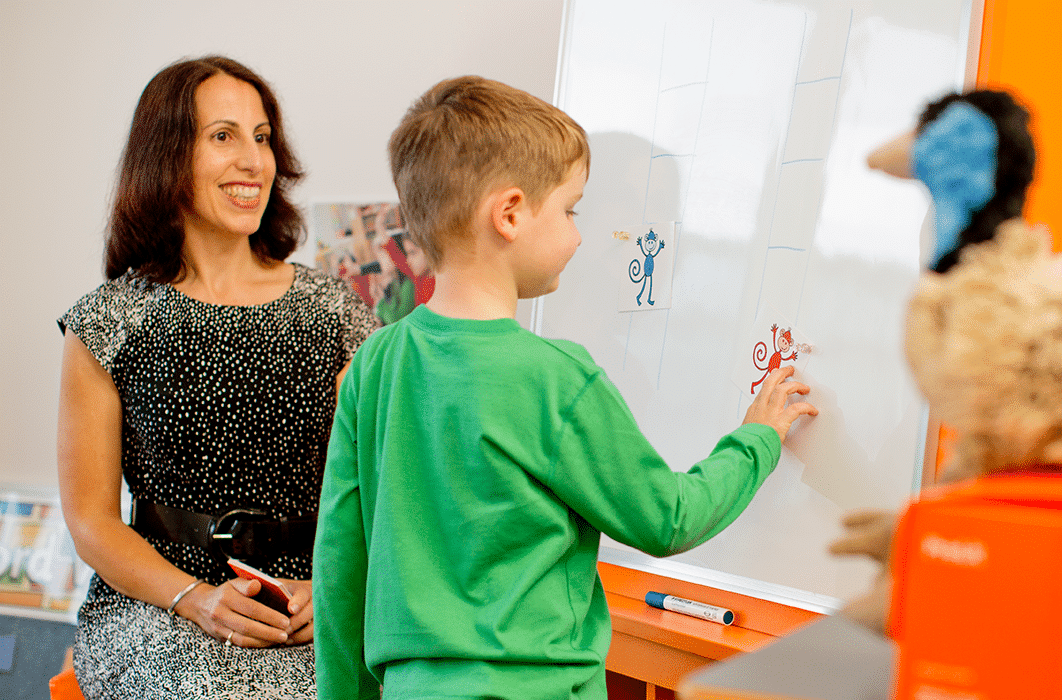Proficiency in oral language in young children is vital for school success. When children start school with strong oral language skills, they tend to have a much easier time learning to read and write than those with oral language difficulties. They are also more likely to quickly adjust to school routines, follow instructions, and get along well with others.
By nurturing oral language skills from birth, parents and early childhood teachers are helping children build a strong foundation for literary and scholarly success.

The role of early childhood educators in literacy development
An early childhood educator plays a crucial role in preparing children for the more formal literacy instruction they will encounter at school. When teachers learn to use language facilitation techniques during everyday routines, young children can build early literacy skills through fun activities like drawing, cooking, craft, and outdoor and pretend play.
Shared storybook reading fosters vital early language and literacy skills, such as print awareness, phonics, and vocabulary and story comprehension skills.
MultiLit’s Speech and Language Specialist Anna Taylor has some practical advice for educators: “How a teacher reads a book to students is very important. When teachers create conversations about stories, children are more likely to make progress in oral language than when they just listen to stories. One way teachers can do this is by preparing questions to ask before, during and after reading.”
Another area teachers can support with is phonological awareness – the ability to understand that words can be broken up into syllables and sounds. This is fostered when a teacher helps students to become more attuned to the sound properties of words, which then prepares them for learning how to read.
Early childhood teachers also have an important role in guiding parents to create oral language and early literacy learning opportunities at home. Inviting parents into the classroom to help with early literacy activities, and providing hands-on workshops about sharing books are great ways to support parents in helping their children at home.
The role of parents in literacy development
Sharing a book every day is one of the simplest and most enjoyable ways that parents can support early literacy development at home. When a caring adult shares a book with a young child, opportunities are created for learning new words and engaging in meaningful conversational exchanges. Children learn how books work and develop their interest in listening to stories.
“When sharing books with a pre-schooler, it is important to have fun,” says Anna. “This means that parents don’t always need to read the whole story from beginning to end. In the early years, children should be encouraged to select books that interest them, to turn the pages and to talk about what is happening in the pictures.”
While reading the same books over and over might be a little boring for adults, it is the repetition and predictability that children often like and that helps them learn new concepts and words.
Building strong literacy foundations with PreLit
For early childhood teachers or parents looking to support their students’ or children’s literacy journey before they reach school, MultiLit’s early literacy preparation program PreLit is here to help. The tools in PreLit are designed to build a foundation of oral language and phonological awareness for young children in a day-care or early educational setting, better positioning them for the more formalised instruction of first year.
PreLit provides educators with 108 well-designed and scripted lessons, and related activities and games.
“Teachers don’t need to spend a lot of time planning what to teach or preparing resources,” says Anna. “By carefully following the program, teachers can be confident that they are providing instruction in two aspects of early literacy that are fundamental to early reading success.”
Delivered to a whole class of students, a small group, or on a one-to-one basis, each lesson is about 30 minutes with the option to break it into two 15-minute components (phonological awareness and shared storybook reading).
PreLit is a versatile and fun program appropriate for all preschool children, regardless of skill level. Effective for one-to-one, small group and whole class delivery, PreLit sets your students up for literacy success at school. Get started today.